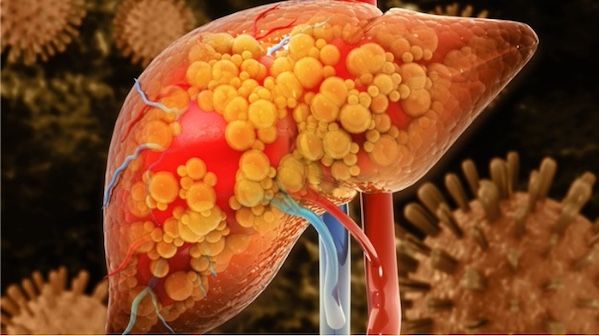Akero’s Phase IIb NASH Data Disappoints, Sends Stock Plummeting
October 12, 2023
Source: drugdu
 378
378
By Tristan Manalac
 Pictured: Illustration of a damaged liver/iStock, Mohammed Haneefa Nizamudeen
Pictured: Illustration of a damaged liver/iStock, Mohammed Haneefa Nizamudeen
Results from the Phase IIb SYMMETRY study showed that Akero Therapeutics’ lead candidate efruxifermin failed to significantly reduce liver fibrosis without worsening non-alcoholic steatohepatitis, the company announced on Tuesday.
In the 36-week analysis, 22% of patients treated with the 28-mg dose of efruxifermin (EFX) saw at least a one-stage improvement in liver fibrosis with no non-alcoholic steatohepatitis (NASH) worsening, whereas 24% of those given the higher 50-mg dose met this endpoint. Neither dose level was statistically better than placebo, in which group 14% of participants demonstrated at least a one-stage fibrosis improvement without disease worsening.
In addition, 21% and 14% of patients in the lower and higher EFX dose groups—respectively— demonstrated NASH resolution alongside fibrosis improvement of at least one stage. These were not significantly better than the 9% rate in the placebo arm, according to Akero.
Despite missing its primary endpoint, the California-based biotech put a positive spin on the disappointing results during a Tuesday morning investor call.
“Although obviously disappointed that the week 36 primary endpoint of fibrosis improvement was missed, we are encouraged by the totality of today’s data and believe it supports moving EFX forward into Phase III in the cirrhotic population,” Akero CEO Andrew Cheng said.
However, investors were not convinced and the company’s share price dropped around 63% in reaction to the data announcement.
SYMMETRY is a randomized, double-blinded and placebo-controlled study enrolling 182 NASH patients, as compared through a biopsy, with compensated cirrhosis. While the study missed its primary endpoint, it still showed promising signals of EFX’s efficacy in key secondary endpoints. In the 28-mg and 50-mg dose groups, 63% and 60% of patients—respectively—achieved NASH resolution. Both rates were significantly higher than in the placebo group, where only 26% of patients showed resolution of NASH.
These figures represent the “highest response rates reported to date for NASH resolution in this patient population,” according to Akero’s announcement.
Biomarker data likewise pointed to EFX’s potential. Compared with placebo, both the lower and higher EFX doses led to significant improvements in non-invasive indicators of fibrosis and liver injury, including ALT and AST levels, Enhanced Liver Fibrosis score and liver stiffness, as measured by the specialized ultrasound equipment FibroScan.
EFX also elicited significant improvements in various markers of glucose and lipid metabolism, including LDL cholesterol, triglycerides and adiponectin.
Akero’s data drop on Tuesday comes amid a shake-up in the NASH space. Late last month, Italian company Alfasigma S.p.A paid around $800 million to buy Intercept Pharmaceuticals, which was formerly seen as the industry leader in NASH. Intercept was trying to get its obeticholic acid tablets approved for the disease, but was rejected for the second time in June 2023.
Intercept terminated its NASH program and laid off approximately a third of its workforce soon after.
In an effort to fill the vacuum in the NASH space, Madrigal Pharmaceuticals announced plans to raise $500 million in a public offering just days after Intercept got acquired. Madrigal is proposing its investigational thyroid hormone receptor agonist resmetirom as a NASH therapeutic. The candidate cleared Phase III in December 2022 and the company in June 2023 launched the rolling submission for its New Drug Application, seeking accelerated approval for resmetirom.
Read more on
- Phase III Clinical Trial of Recombinant Staphylococcus Aureus Vaccine Progressing Normality January 21, 2026
- Its drug marketing application for injectable iza-bren has been accepted January 21, 2026
- Kain Technology withdrew a drug registration application, resulting in a profit reduction of 111 million yuan in 2025 January 21, 2026
- Received Notice of Approval for Drug Clinical Trial January 21, 2026
- Breaking news! AstraZeneca to be delisted from Nasdaq. January 21, 2026
your submission has already been received.
OK
Subscribe
Please enter a valid Email address!
Submit
The most relevant industry news & insight will be sent to you every two weeks.



